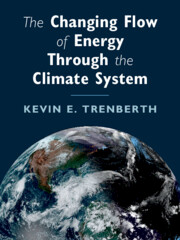Book contents
- The Changing Flow of Energy through the Climate System
- The Changing Flow of Energy through the Climate System
- Copyright page
- Contents
- Foreword
- Preface
- Acknowledgments
- 1 Earth and Climate System
- 2 Earth’s Energy Imbalance and Climate Change
- 3 Earth’s Energy Balance
- 4 The Sun–Earth System
- 5 Observations of Temperature, Moisture, Precipitation, and Radiation
- 6 The Climate System
- Flows of Energy
- 7 The Weather Machine
- 8 The Dynamic Ocean
- 9 Poleward Heat Transports by the Atmosphere and Ocean
- 10 The Changing Hydrological Cycle
- 11 Teleconnections and Patterns of Variability
- 12 El Niño
- 13 Feedbacks and Climate Sensitivity
- 14 Earth’s Energy Imbalance Estimates
- 15 Attribution and the Hiatus
- 16 Prediction and Projection
- 17 Emissions and Information
- 18 Climate Change and Environmental Issues
- Glossary
- Acronyms
- Bibliography
- Index
- References
11 - Teleconnections and Patterns of Variability
from Flows of Energy
Published online by Cambridge University Press: 25 February 2022
- The Changing Flow of Energy through the Climate System
- The Changing Flow of Energy through the Climate System
- Copyright page
- Contents
- Foreword
- Preface
- Acknowledgments
- 1 Earth and Climate System
- 2 Earth’s Energy Imbalance and Climate Change
- 3 Earth’s Energy Balance
- 4 The Sun–Earth System
- 5 Observations of Temperature, Moisture, Precipitation, and Radiation
- 6 The Climate System
- Flows of Energy
- 7 The Weather Machine
- 8 The Dynamic Ocean
- 9 Poleward Heat Transports by the Atmosphere and Ocean
- 10 The Changing Hydrological Cycle
- 11 Teleconnections and Patterns of Variability
- 12 El Niño
- 13 Feedbacks and Climate Sensitivity
- 14 Earth’s Energy Imbalance Estimates
- 15 Attribution and the Hiatus
- 16 Prediction and Projection
- 17 Emissions and Information
- 18 Climate Change and Environmental Issues
- Glossary
- Acronyms
- Bibliography
- Index
- References
Summary
The weather systems undergo incredibly rich variety and never repeat. If left alone in the atmosphere, mid-latitude storms would continually march eastwards, modulated by very large-scale atmospheric waves – planetary waves – set up by the land–sea differences and continental mountain ranges. The latter are mainly in evidence in the northern hemisphere and vary from summer to winter because the mid- to high-latitude land is colder than the adjacent seas in winter, but warmer in summer. Nevertheless, this idealized state seldom exists and frequently the weather systems get stuck into a certain repeating pattern of sorts, called weather regimes.
- Type
- Chapter
- Information
- The Changing Flow of Energy Through the Climate System , pp. 162 - 179Publisher: Cambridge University PressPrint publication year: 2022

